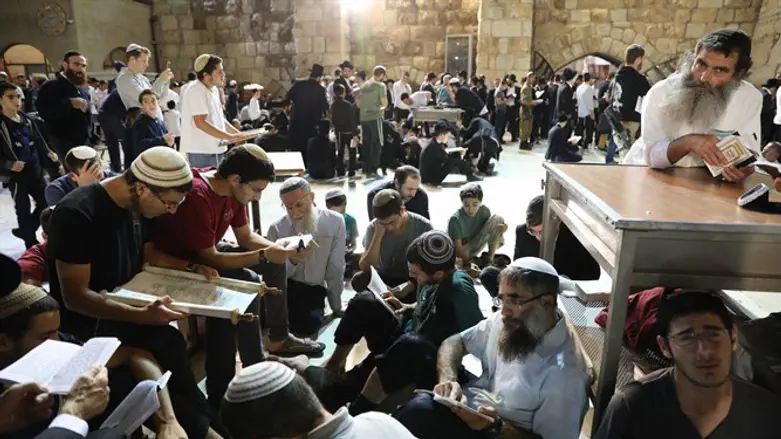
The prayer of Nachem originated in the Talmud Yerushalmi in the tractate of of Brachot and Taanit. The wording underwent several changes during the period of the Gaonim and the Rishonim until it was formulated in the way that appears in the siddur today.
The Ashkenazi custom nowadays is to say: "Console, o L-rd, the mourners of Tzion and Yerushalayim and the grieving, desolate and plundered city devoid of her children…she sits with her head covered like a barren woman without children…”
After the Six Day War and the liberation of Old Jerusalem, the question arose as to whether it would be correct to change the wording of the prayer of Nachem, because it would seem that the words of the prayer are incorrect and do not reflect the current status of Jerusalem. Furthermore, in using the original wording we are seemingly both lying and being inappreciative to G-d for returning Jerusalem to us and granting us a modern and beautiful city, with yeshivot and synagogues galore.
Although there were those who thought that the text should be "renovated" a little, the vast majority of Gedolei Yisrael and the various communities continue to recite the text as it was said in previous generations, and believe that it should not be changed. In my humble opinion here are four reasons why they are correct:
The first reason is that nowadays it is not correct or worthwhile to change the wording of any prayer in order to maintain the unity of the people of Israel. If we start changing the wording of prayers it will never end. There are many today who have difficulty with parts of prayer ("Shelo Asani Goy," "Yekum Purkan ... di Bavel," and others). If we start charging the prayers it wouldl cause a big split between the various factors and communities. The arrangement of the prayer is a unifying factor and therefore it is very worthwhile not to touch it.
The second reason is that when the great Rishonim composed prayers, beyond the actual words of the prayers there are also many hints and secrets hidden in the letters and words. For example, in the prayer of Nachem the words “אבלה חרבה בזויה שוממה” are an acronym for “אחבש” – “I will mourn” referring to the verse “I will mourn for their sorrow”, which is a hint that G-d will heal the city of Jerusalem.
The third argument is that it is not true to say that words of Nachem are incorrect nowadays. It is true that a Jew who said Nachem hundreds of years ago pointed out in his prayer that there is no Jewish settlement in Jerusalem and it is completely deserted, but even we who were privileged to return to the Land of Israel and see Jerusalem in its glory in so many ways, know how long the road is ahead of us. How much idolatry and immodesty there is in Jerusalem, how few Jews live in the Old City in relation to the Gentiles, what happens on the Temple Mount and more. Therefore, we too can easily identify with the words of Nachem.
This is the beauty and wonder in the words of prayers established by our ancestors, that each and every generation can mold into those words a meaning appropriate to its generation without changing the actual text. Even today we use the same ancient wording into which we will cast the meaning that is appropriate for our generation.
The fourth and most central reason leads us to an understanding of Tisha B'Av in our generation. In the Jewish calendar, every day has a uniqueness in which a certain aspect is emphasized. For example, on Yom HaAtzmaut we thank G-d for “our redemption in this generation”. Even on Yom HaAtzmaut we know that the State of Israel still has a long way to go to reach its full potential, but on this day we emphasize the good and ignore - for the moment - what still needs fixing. On all other days of the year we speak of both the good and the bad in our beloved country, but on Yom HaAtzmaut we emphasize only the good, because on that day our focus is on thanksgiving for the good we have gained after nearly 2000 years of exile.
In the same vein but contradictory, when we talk about Tisha B'Av, we concentrate on what we don't have. Before and after Tisha B'Av we will also focus on the great good we have received, but on this day we emphasize the negative – the loss of our holy Temple and the lack the complete divine revelation. In the fact that we mourn the destruction of Jerusalem precisely in our special generation, we emphasize that we are not satisfied with what we have, and do not stop believing and hoping for the day when the revelation of God will be complete.
May we, with G-d's help, merit the building of the Temple and the complete redemption. Then, according to all opinions, instead of the prayer of Nachem Tisha B'Av will become a holiday, a day of thanksgiving for our complete and total redemption.
Rabbi Shlomo Sobol is the head of the Barkai organization and the rabbi of the Shaarei Yonah Menachem community in Modi'in.